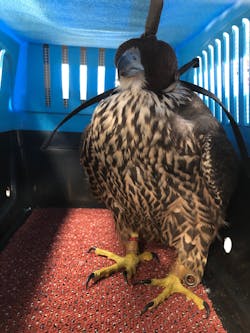Skyport Handles 30 Live Falcons at Prague Airport for Use at Airports in Kuwait to Reduce Bird Strikes
Prague, Czech Republic, Sept. 1, 2021: Czech ground handling specialist Skyport has handled 30 live falcons from Prague, Czech Republic to Kuwait City, Kuwait which will be used at airports to keep them clear of other bird species to combat bird strike incidents.
The birds of prey, bred in the Czech Republic, were transported in secure, carpeted boxes, and were provided with falcon hoods to help reduce stress and keep them safe.
Skyport specializes in quick turnaround for live animal consignments, and has recently handled rhinoceroses, Komodo dragons and a polar bear.
“At Skyport, we ensure live animal cargos receive the best care, best welfare, and as little stress as possible, so we move the animals at the very last moment in order to make their stay at our facility and overall travel time as short as possible,” said David Adámek, chief executive officer, Skyport.
“If there is a shipper request regarding any special considerations such as temperature, storage, or feeding instructions, we plan the project accordingly to make sure these needs can be followed and maintained.”
Skyport operates the International Air Transport Association (IATA)’s Live Animal Transportation regulations, Skyport’s in-house cargo handling manual, and the airline cargo handling manual for live animals, as well as receiving supervision by the shipper, border station veterinary staff, and the airline loadmaster.
“Skyport collects live animal cargoes one hour before departure followed by 30-40 minutes of animal checks and pre-flight preparations to ensure safety, comfort, and minimal stress,” said Antonin Kovács, sales director, Skyport.
“The animals are then delivered to the aircraft approximately 10 minutes before departure where further checks take place to ensure secure stowage and that a suitable amount of food and water is available.”
